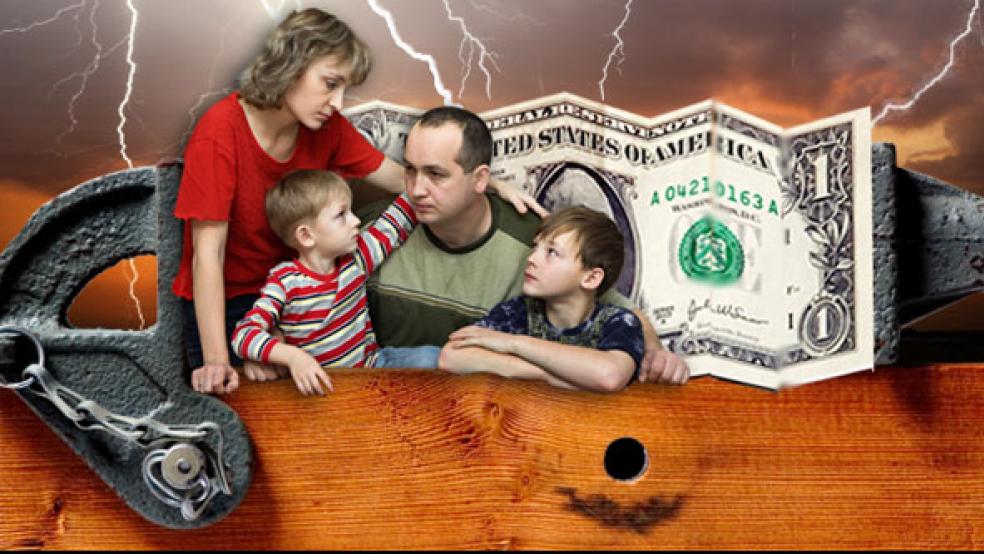If we want to ensure that our children and grandchildren have the brightest possible future, the national debt is not the most important problem to address. Reversing the polarization of the labor market – the hollowing out of the middle class and the associated rise in inequality over the last thirty years or so – is much more important. But money driven politics and a political class that has all but forgotten about the working class – Democrats in particular have forgotten who they are supposed to represent – stand in the way of progress on this important problem.

As everyone surely knows by now, the last few decades have not been kind to workers in the middle and lower parts of the income distribution. Technological change, globalization, and the decline of unions that gave workers political clout and countervailing power in negotiations over wages, benefits, and working conditions have eroded the economic opportunity and security that the post World War II era brought to working class households.
During that time it was possible, with little formal education, to get a relatively secure job offering decent pay and benefits. But those days are mostly gone, and changes in labor market conditions during the recent recession highlight the longer-term trends. Consider, for example, four facts from a recent speech by Federal Reserve Governor Sarah Raskin.
First, around two-thirds of the jobs lost during the recession were in moderate-wage occupations, but more than one-half of subsequent job gains have been in low wage jobs. As she says, recent job gains have been largely concentrated in lower-wage occupations. Second, since 2010 the average wage for new hires has actually declined. Third, about one-quarter of all workers are "low wage" (just over $23,005 per year in 2011 dollars). Finally, involuntary part-time work is increasing, and more than a quarter of the net employment gains since the end of the reces-sion involve part-time work.
Solving these and other problems – low and stagnant wages, reduced health care and retirement benefits or no benefits at all, fewer hours, reduced job security, and, if Republicans get their way, substantially less social insurance – won’t be easy. To be successful, we must make jobs our top priority.
Instead, our focus has been on the debt, but all of the hand wringing over the debt and the future of our children is a ruse by Republicans that diverts our attention from the plight of the working class. As I explained a few weeks ago, we can pay our bills. If we have problems, it will be because of the politics surrounding the debt, the political brinksmanship conservatives have used in pursuit of ideological gains, not the economics. If reducing the debt was the true goal of Republicans, then tax increases would be on the table. Republicans see the large debt, much of which was caused by the recession, as a golden opportunity to reduce the size of government and, by extension, to reduce the chance that high-income households will have to pay higher taxes to support social programs, the overriding political goal.
I don’t blame Republicans for their efforts. I wish the working class was more important to Republicans, and I cannot understand the indifference to the struggles of so many people. But that’s not who Republicans are. Fundamentally, it’s the party of the rich and this is a chance to lower government spending and reduce the pressure for tax increases on high-income households.
I do, however, blame Democrats for allowing them to be successful. Even though unemployment is extraordinarily high and job opportunities, when they exist at all, are mostly at reduced wages, and even though the future for the working class looks increasingly bleak, too many Democrats have aided and abetted Republicans in this diversion of attention from jobs to the national debt.
I suppose there are true believers. Just as there are some Republicans who really do believe that minimal government is best, it’s not just a convenient argument for protecting wealthy interests, there are some Democrats who truly – and wrongly in my view – fear that interest rates will spike and cause big problems if we don’t do something about the debt immediately.
But more broadly the indifference of both parties to the problems of the unemployed – the failure to take any real action to help after it became clear the initial stimulus package was far, far from enough – speaks to the lack of political power of the majority of people in the U.S. today. Money talks loudly in Washington, and there was a time when unions gave the working class a voice that could be heard. That voice has faded with the demise of unions, and – as people often complain – Washington is not as responsive to the needs of the vast majority of households as it ought to be. Unless Democrats can remember who they are supposed to represent without the “memory aid” provided by powerful, well-funded unions, it’s hard to see how that will change.






